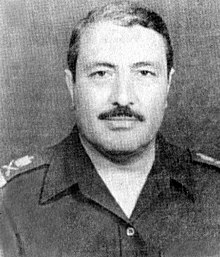Salah Aboud Mahmoud
| Salah Aboud Mahmoud | |
|---|---|

Salah during his tenure as Commander of the 3rd Corps in the late 1980s.
|
|
| Native name | صلاح عبود محمود |
| Born | 1950 (age 66–67) Baghdad, Iraq |
| Allegiance |
|
| Service/branch |
|
| Rank | Major-General |
| Unit | 3rd Tawakalna ala-Allah Armoured Division |
| Commands held | Iraqi Third Corps |
| Battles/wars | |
Salah Aboud Mahmoud (born 1950; Arabic: صلاح عبود محمود) is a former Iraqi Army general, best known for his role in Battle of Khafji and 73 Easting, during the Persian Gulf War.
On January 29, 1991, Salah took part in battle with coalition forces to take control of the Saudi Arabian city of Khafji. Mahmoud also took part in the Iran–Iraq War of 1980–1988, along with the tank battle of 73 Easting.
Salah was appointed commander of the Iraqi Third Corps in the aftermath of the Iran–Iraq War, a regular process in the Iraqi military to ensure that former high-ranking officers did not pose a threat to the Ba'athist Iraqi government. He was later governor of Dhi Qar Province, a Shia province which had briefly been taken by the 1991 Iraqi insurgency before it was brutally suppressed.
In December 1994, Major-General Wafiq Al-Samarrai defected to Jordan and called on officers to revolt against Saddam Hussein's regime. Salah was one of them he called on. He did not, and despite his connections to many of the purged officers he was never executed. Rather, he was gradually forced out of his government roles. President Hussein divided Iraq into four administrative regions in 1998. Many expected Salah would be recalled to the military and appointed to the Central Euphrates governorship as governor Mizban had been dismissed. However this did not come to pass and Mizban was reinstated.
After the Invasion of Iraq in March 2003, Salah disappeared and his current whereabouts are unknown.
...
Wikipedia
